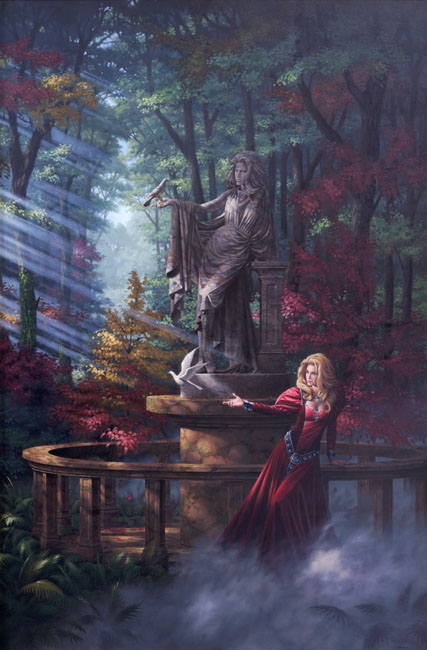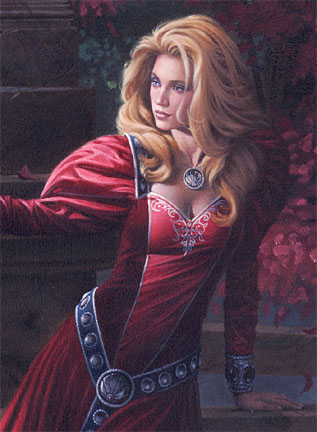| As the enlightenment (the philosophy that human endeavor should be
subject only to a guiding principle of logic and reason, and not to
any irrational superstition) continues to drive society’s evolution, we
grow increasingly overwhelmed by the bewildering complexities of a perpetually
changing world. 20th
century modernism has created a society that depends for its existence
upon hyper-accelerated growth and development - the commercial imperative
of relentless material acquisition.
We are instructed - from cradle to grave, in ways obvious and covert
- that we can never have enough of our own product and so must possess
the newest incarnation of every conceivable object and experience.
This is the lure - and snare - of modernity.
But perhaps we sometimes seek the safe and simple comfort of things
known and familiar, like the woman (a manifestation, or angel, of civilization)
who is leaning to the right upon the stable edifice of history.
Even while she reaches for the liberalizing light of the left,
she rests upon conservative tradition and the past.
This painting depicts what we all hope is the endeavor of civilization:
the human quest for wisdom. It
seems that whether we design our social and political structures to the
ethereal and subjective left or the material and objective right makes
no difference. Societies can
be dynamic, constantly redefining themselves in the pursuit of some idealistically
defined objective, or static, relying on the well-established precedence
of history. Either way, people
don’t change much: we feel joy and misery, hope and despair, just as people
did 500 - or 5000 - years ago. It
is, apparently, easier to reinvent society, than ourselves.
In Raphael’s great painting, The School of Athens, we see a timeless
illustration of the problem. Plato,
full of idealistic fervor, gestures heavenward: “The proper aim of all
thought is upon the eternal forms of divine mind!”
The pragmatic, moderating hand of Aristotle, however, gestures toward
the earth: “The proper aim of all action is the here and now.”
Idealists, like the cleansing forest fire, clear away the corruption
and decay of old growth; but builders, like all new growth, are always
fixed upon the practical matters of immediate need.
How can either way be the only path?
It seems the debate - Plato’s hand or Aristotle’s - will remain
with us for some great time.
Until individuals, and not just the society around them, change in some
fundamental, perhaps biological, way, the realization of our aspirations
will never be found in this or that administrative mechanism.
Some believe in strength and fear the failure of weakness; some
believe in compassion and fear the failure of cruelty.
But every child understands that two parents, providing both
strength and compassion, provide the greatest benefit.
And so, we shall always be in moving shadows and lost in our own
vacillating ignorance (the mist), until we abandon the comfortable security
of invariance and venture alone through the forbidding labyrinth of the
forest darkness - our own unknown and unrealized potential.
Enlightenment is not found left or right, but at a distant place,
through and beyond the wilderness...
|

